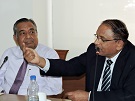The VIF on 14 April 2016 hosted hon’ble Jayampathy Wickramaratne, Member of Parliament (Sri Lanka) and Chairman of the Committee on Constitution Reforms for an interaction on the Constitution-making process in Sri Lanka, a process that got underway in January 2016 with Prime Minister Ranil Wickremesinghe setting up a committee of experts in his office to assist legislators in drafting a new Constitution.
Having recovered lately from one of the bloodiest secessionist wars in history, Sri Lanka is looking for a more representative and inclusive Constitution in an effort to avoid another ethnic war. In a departure from the past practices when  Constitutions were drafted outside the Parliament, all sitting members of Sri Lanka’s Parliament are entrusted with formulating the Constitution. While imperatives pushing the legislators to a new Constitution were part of a detailed structured presentation made by hon’ble Wickramaratne, the ensuing interaction focused largely on potentially contentious provisions of the Constitution including nature of the Constitution, electoral laws, Presidential powers and devolution of powers to the provinces, among others.
Constitutions were drafted outside the Parliament, all sitting members of Sri Lanka’s Parliament are entrusted with formulating the Constitution. While imperatives pushing the legislators to a new Constitution were part of a detailed structured presentation made by hon’ble Wickramaratne, the ensuing interaction focused largely on potentially contentious provisions of the Constitution including nature of the Constitution, electoral laws, Presidential powers and devolution of powers to the provinces, among others.
While Mr. Wikramaratne’s presentation focused more on techno-legal issues, he made a few broad observations to give an idea of the underlying dynamics in re-writing the Constitution. It emerged after the presentation that ceding powers to the provinces while retaining a unified character for the government has perhaps remained by far the biggest challenge before the constitution-drafting committee.
The Sri Lankan lawmaker however asserted that it is common for concentrated communities across the world to demand greater share of state power. The Indian interlocutors, on the other hand, suggested that rather than pandering to  majority (Sinhalese) sentiments, Sri Lankan lawmakers should concentrate more on incorporating the principle of equality in their Constitution, a more universally accepted norm for democratic countries around the world. It was also mentioned that Sri Lankans perhaps could draw upon international treaties to strengthen their domestic laws, especially on human rights. In so far as defining the nature of Constitution and devolving powers to the provinces are concerned, a little jugglery with words perhaps might do the trick. They however underlined that process of Constitution writing in Sri Lanka should be completed within a stipulated timeframe so as to protect it from getting vitiated by extraneous factors which might creep in if the process gets unduly delayed. General NC Vij, former Chief of the Indian Army and currently Director, VIF, who oversaw the proceedings, underlined Sri Lanka as an important neighbour because of its strong cultural and ethnic linkages with India as also its strategic location in the Indian Ocean.
majority (Sinhalese) sentiments, Sri Lankan lawmakers should concentrate more on incorporating the principle of equality in their Constitution, a more universally accepted norm for democratic countries around the world. It was also mentioned that Sri Lankans perhaps could draw upon international treaties to strengthen their domestic laws, especially on human rights. In so far as defining the nature of Constitution and devolving powers to the provinces are concerned, a little jugglery with words perhaps might do the trick. They however underlined that process of Constitution writing in Sri Lanka should be completed within a stipulated timeframe so as to protect it from getting vitiated by extraneous factors which might creep in if the process gets unduly delayed. General NC Vij, former Chief of the Indian Army and currently Director, VIF, who oversaw the proceedings, underlined Sri Lanka as an important neighbour because of its strong cultural and ethnic linkages with India as also its strategic location in the Indian Ocean.






